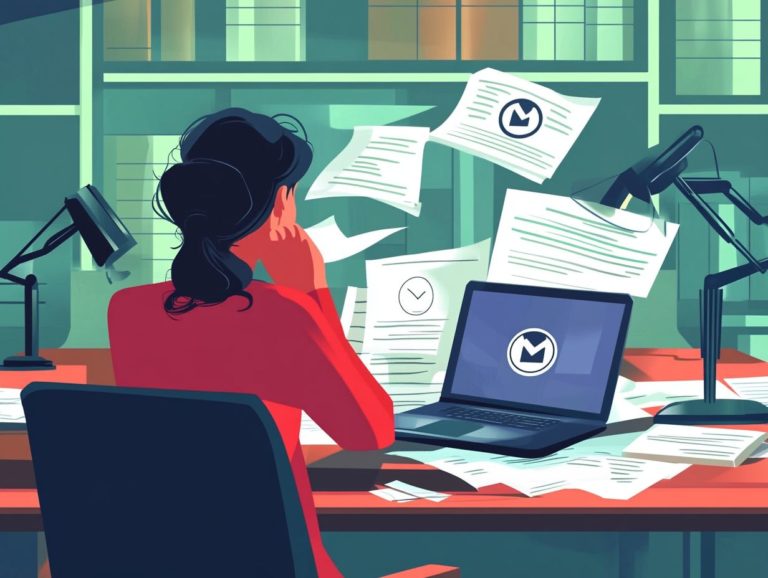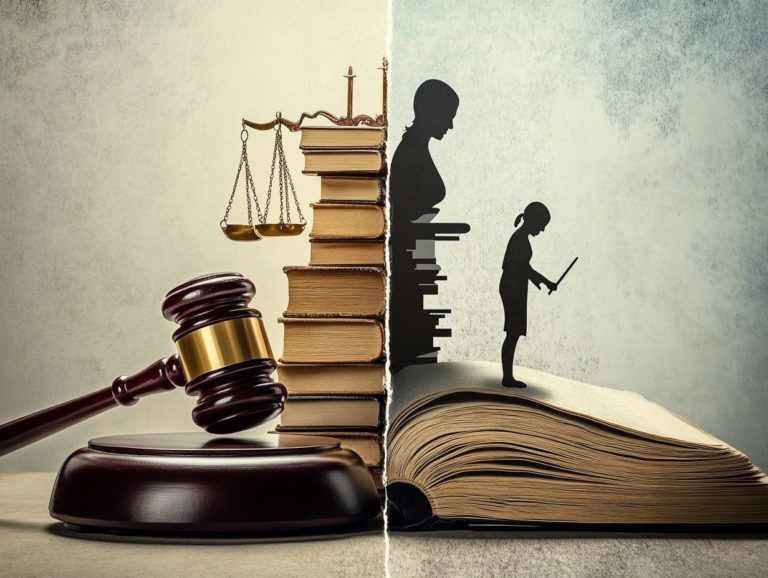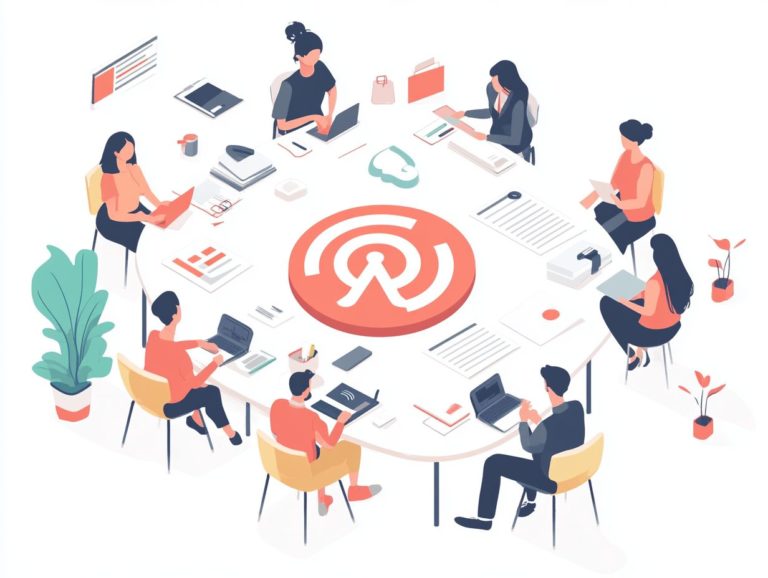5 Key Considerations for Copyright Licensing
Navigating the world of copyright licensing may seem overwhelming, but grasping its nuances is essential for you as a creator, business owner, or anyone engaged with intellectual property.
This article presents a clear breakdown of vital topics, covering everything from the fundamentals of copyright laws to the various types of licenses available.
Uncover the duration of copyright protection and the critical factors to consider when selecting the right license. You’ll also learn about the advantages that come with obtaining one.
By the end of your reading, you’ll be well-equipped to make informed decisions that safeguard your creative work and help you avoid expensive missteps.
Dive in to gain clarity on copyright licensing and its significance in today s digital landscape.
Contents
- Key Takeaways:
- 1. Understanding Copyright Laws
- 2. Types of Copyright Licenses
- 3. Duration of Copyright Protection
- 4. Factors to Consider When Choosing a License
- 5. How to Obtain a Copyright License
- What Is Copyright Licensing and Why Is It Important?
- What Are the Consequences of Not Obtaining a Copyright License?
- What Are the Most Common Types of Copyright Licenses Used?
- How Can a Business Determine Which License Is Best for Them?
- Unlocking the Secrets of a Copyright License Agreement
- Frequently Asked Questions
- What is copyright licensing and why is it important?
- What are the 5 key considerations for copyright licensing?
- How do I know if a work is protected by copyright?
- Can I use copyrighted material without a license?
- What are the consequences of using copyrighted material without a license?
- Are there any exceptions to copyright licensing?
Key Takeaways:

- Understand the basics of copyright laws to avoid infringement.
- Explore various copyright licenses to meet your needs.
- Ensure legal use of protected works by obtaining the right licenses.
1. Understanding Copyright Laws
Understanding copyright laws is vital for your success as a church leader or nonprofit organization, especially when navigating the details of U.S. Copyright Law.
This knowledge ensures compliance and protects your intellectual property rights during religious services and creative programs.
By grasping these laws, you can prevent copyright infringement, which could lead to costly legal disputes.
Familiarity with copyright allows you to effectively manage your use of copyrighted materials, such as hymnals and multimedia presentations for your congregation.
Securing the appropriate music licenses lets you perform songs during worship without the worry of unintentional violations.
Registering your original works safeguards your unique contributions, giving you peace of mind that your creative expressions can flourish without the risk of unauthorized reproduction.
Being aware of copyright laws enables you to honor your spiritual mission while protecting your artistic assets.
2. Types of Copyright Licenses
You ll find a variety of copyright licenses available, each tailored to meet the unique needs of both creators and users.
This includes blanket licenses, performance licenses, and even a religious service exemption specifically for churches.
These licenses are essential for navigating the intricate world of copyright laws.
They ensure that artists receive fair compensation for their invaluable work.
For example, blanket licenses allow venues to play a vast catalog of music, simplifying the process for businesses.
This approach fosters a vibrant artistic community.
Performance licenses cover live shows and public broadcasts, protecting against unauthorized use.
Organizations like ASCAP, BMI, and SESAC actively manage these licenses, charging fees that safeguard creators from copyright infringement.
This cultivates a sustainable ecosystem where music can thrive, benefiting everyone involved in the creative process.
3. Duration of Copyright Protection
The duration of copyright protection varies depending on several factors, including the type of work and whether it s registered with the Copyright Office.
In the United States, most works enjoy a copyright term that lasts for the life of the creator plus an additional 70 years.
However, this duration can be swayed by legislative changes, as seen in the recent case of Thaler v. Perlmutter, which raised important questions about authorship and copyright ownership.
For churches and nonprofit organizations, the implications of these rulings are particularly significant.
Understanding the current duration of copyright protection is essential for these entities, as it directly impacts their ability to use, distribute, and safeguard their intellectual property.
This knowledge helps ensure compliance with legal requirements while steering clear of potential infringement.
4. Factors to Consider When Choosing a License

When selecting a copyright license, think about some important factors such as the type of content you’re dealing with, your audience, potential licensing fees, and the specific requirements of your church or nonprofit organization. Additionally, keep in mind the 5 things to consider when licensing your brand. These considerations are crucial for avoiding copyright infringement.
This is especially significant for churches that frequently incorporate music into their services. Different licenses may be necessary depending on the nature and purpose of the songs.
For example, hymns and contemporary worship music come with distinct licensing requirements. It’s essential to understand the rights to perform music publicly, as churches not only cater to their congregation but also often extend their reach to the broader community through outreach initiatives.
As you evaluate the creative programs your church offers, keep in mind that this can influence the content that needs licensing. Talking to licensing agencies specializing in church music can help clarify these complexities, ensuring your worship space remains compliant while fostering a vibrant and enriching environment.
5. How to Obtain a Copyright License
Obtaining a copyright license requires a clear understanding of the necessary steps. Start by researching the copyright status of your materials, then seek permission from the rights owners, and possibly register with the Copyright Office.
To navigate this process effectively, begin with thorough research on the copyright status of the material in question. This information can often be found through online databases or by consulting experts in intellectual property.
Once you ve determined the copyright status, the next step is to reach out to the rights owners to request permission. Make sure to document all communications for future reference.
Church leaders must understand these steps, as this not only aids in compliance but also helps prevent unnecessary legal issues. It s prudent to keep records of all licenses obtained and any correspondence with rights owners, as this can simplify renewal processes or future permission requests.
What Is Copyright Licensing and Why Is It Important?
Copyright licensing is the permission needed to use someone else’s creative work. This stands as a cornerstone of intellectual property law.
For churches and nonprofit organizations, understanding this aspect is crucial to avoid copyright infringement and comply with legal standards.
Grasping the intricacies of copyright licensing enables you to utilize creative works responsibly while honoring the rights of the original creators. When churches incorporate music or art into their services, obtaining the needed licenses transcends mere legal obligation; it becomes an ethical commitment that nurtures creativity within the community.
Neglecting to secure proper licensing can lead to severe legal repercussions, including hefty fines and litigation. Such issues can divert focus and resources from your mission.
Therefore, navigating the copyright landscape is essential, not only for protecting your own intellectual property but also for fostering a culture of respect and integrity in creative expressions.
What Are the Benefits of Obtaining a Copyright License?
Obtaining a copyright license brings a wealth of advantages, such as robust legal protection and enhanced compliance with copyright laws. It also allows you to incorporate creative works into your church services without the looming threat of infringement, especially when following tips for protecting your copyrighted work.
By securing the appropriate licenses, you can confidently weave popular hymns or contemporary worship songs into your services, creating a warm and inviting atmosphere for your congregants. This proactive approach streamlines your worship practices and cultivates positive relationships with artists and rights owners, ensuring that those creators receive the respect and compensation they deserve for their artistry.
Consider this: when your church wishes to showcase a video during a sermon or stream a live service online, having the right licenses in place effectively mitigates potential legal complications. This allows your congregation to focus on what truly matters their spiritual growth rather than getting entangled in the intricate web of copyright regulations.
Act now to secure the licenses you need to protect your church!
Learn how to get your licenses today and keep your church protected!
What Are the Consequences of Not Obtaining a Copyright License?

Failing to secure a copyright license can lead to serious repercussions, including copyright infringement claims, hefty financial penalties, and damage to the church’s reputation. To navigate this complex area, it’s essential to understand the myths about licensing agreements, which highlights the critical importance of adhering to proper licensing practices.
The legal fallout from such oversight can spiral into costly litigation, draining valuable resources devoted to advancing the church’s mission. Nonprofits often operate on tight budgets, so fines and legal fees can weigh heavily.
Public perception is crucial; if the church is viewed as disrespecting intellectual property rights, it could quickly hurt chances of attracting donations and volunteers, which are vital for sustaining operations and enhancing outreach efforts.
What Are the Most Common Types of Copyright Licenses Used?
Among the most prevalent types of copyright licenses you ll encounter are blanket licenses, performance licenses, and music licenses. Each serves a distinct purpose for churches and organizations that require access to copyrighted materials.
A blanket license allows you to perform a wide variety of music without the hassle of obtaining individual permissions for each song. This flexibility enables you to incorporate diverse musical expressions seamlessly into services.
Performance licenses grant the rights to publicly perform copyrighted works, which is essential for worship gatherings where congregational singing takes center stage.
Music licenses enable reproduction of songs in various formats, whether printed handouts or digital media, ensuring congregants can fully engage with the music.
By understanding and effectively utilizing these licenses, you can enrich worship experiences, foster community engagement, and honor the creative rights of artists.
How Can a Business Determine Which License Is Best for Them?
Determining the best copyright license for your business, including churches and nonprofits, requires a thoughtful approach aligned with specific needs and the type of content created. To navigate this complex area, consider learning about the 5 things you didn’t know about copyright law and potential licensing fees.
Analyze how your content will be used, assess your audience reach, and consider risks related to copyright infringement that could emerge from improper licensing by reviewing licensing agreements for artwork: key considerations.
Evaluate the types of content you wish to utilize music, images, or written works while grasping the rights associated with each.
Resources like the Copyright Office can offer invaluable guidance in navigating these intricate licensing challenges, ensuring compliance while effectively advancing your mission.
Unlocking the Secrets of a Copyright License Agreement
A copyright license agreement should encompass vital components, such as:
- Permissions granted
- Limitations
- Duration of the license
- Scope of use
Clearly defining these elements creates a framework for the relationship between the copyright holder and the user, promoting transparency and accountability.
For instance, the permissions granted specify the particular uses allowed, helping prevent any unintentional infringements. Limitations outline the actions that are explicitly prohibited, safeguarding the integrity of the original work.
The duration of the license establishes a timeframe for use, preventing misunderstandings that could lead to unauthorized use beyond the agreed period. A well-defined scope of use sets clear boundaries, ensuring proper utilization of the material.
Without clarity in these critical areas, conflicts can emerge, potentially resulting in legal issues that jeopardize operations and reputation.
Frequently Asked Questions

For any additional questions regarding copyright licensing, consult a professional or review your current licenses to ensure compliance and consider these 5 tips for copyright compliance in marketing to protect your organization.
What is copyright licensing and why is it important?
Copyright licensing is the legal process of getting permission to use someone else’s creative work. It protects the original creator’s work and ensures it’s used properly.
What are the 5 key considerations for copyright licensing?
Understand copyright laws and identify the copyright owner. Additionally, be aware of red flags in licensing agreements, determine the type of license you need, negotiate terms and fees, and ensure proper attribution.
How do I know if a work is protected by copyright?
Any original creative work, like books, music, videos, and images, is protected by copyright as soon as it’s created. Look for the copyright symbol ( ) or “All Rights Reserved” to confirm protection.
Can I use copyrighted material without a license?
No, using copyrighted material without permission is infringement. Always get a license to keep your use legal.
What are the consequences of using copyrighted material without a license?
Using copyrighted material without a license can lead to legal action, including fines and lawsuits. To avoid these issues, always obtain a license or permission.
Are there any exceptions to copyright licensing?
Yes, exceptions exist, like the fair use doctrine. It allows limited use of copyrighted material for criticism, commentary, and education, but these exceptions are limited and should be considered carefully.





